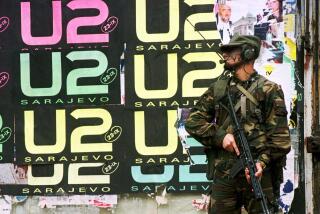NORTH HOLLYWOOD : Bosnians Share Personal Pain With Students
More than 7,000 miles east of here, the war-torn city of Sarajevo might as well be on another planet to teen-agers at North Hollywood High School. But the students confronted the carnage there Wednesday when three Bosnian visitors shared their heart-wrenching experiences with students.
The visitors, members of an ethnically diverse theater troupe of Serbians, Croatians and Moslems, stopped by the school during a three-week trip intended to promote international understanding and cooperation.
Rep. Howard Berman (D-Mission Hills) arranged the visit in the hope that it would also help promote racial and ethnic harmony in the diverse student population. Two years ago, the high school was the scene of a racially motivated melee between African Americans and Latinos that had to be quelled by police in partial riot gear. There have been no outbreaks since, and the issue was never overtly mentioned during the visitors’ 45-minute talk.
Tears came to the eyes of the visitors--two men, both 33, and a woman, 25--as they told the students of the losses they and their families have suffered since civil war broke out about three years ago in the former Yugoslavia.
“Imagine talking to a friend like I was, just telling jokes, and he falls down because of a sniper,” said guitarist Amir (Lazy) Beso, who himself was seriously injured by sniper fire. “In a way, unfortunately, you get used to it,” added lead singer Srdjan (Gino) Jevdjevic. “It’s just normal to be dead in Sarajevo.”
Despite the danger, the theater troupe was formed and has given 70 performances so far of “Hair,” the 1960s musical that celebrates freedom of expression. Staged under trying conditions, including shortages of food, water and electricity, the play goes on without ever having its location and show times advertised for fear of violence. But through word of mouth, it has always played to a full house, said troupe administrator Dzenita Becic.
The Sarajevans’ three-week trip to Los Angeles, Washington and New York cost about $24,000 and was paid for by the United States Information Agency, which brings some 5,000 visitors from other countries here annually, a spokesman said.
Many of the 95 North Hollywood students who listened to the 45-minute talk are from strife-ridden countries themselves and said they empathized with the Sarajevans’ plight.
“It reminded me of my country,” said Karabet Sungulyan, 16, who is Armenian. “I lost relatives in the civil war there.”
But teacher Deborah Bowers-Sherick sought to draw a broader parallel. “They said the most terrifying part of war is you get used to violence. Aren’t there places in the city where violence unfortunately is part of everyday life?” said Bowers-Sherick, drawing nods from several students.
More to Read
The biggest entertainment stories
Get our big stories about Hollywood, film, television, music, arts, culture and more right in your inbox as soon as they publish.
You may occasionally receive promotional content from the Los Angeles Times.










